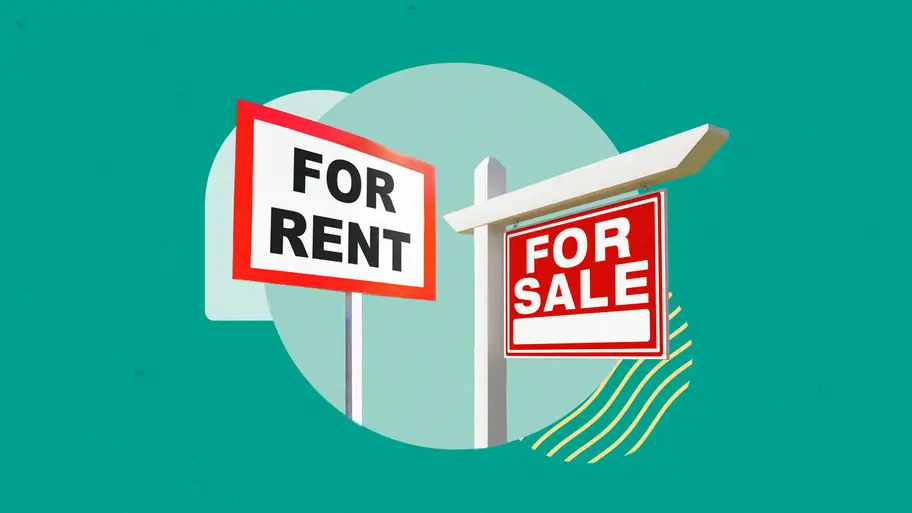Real Estate: Should I Rent or Own?

It’s not uncommon to hear many young people suggest that home ownership is now unaffordable compared to generations past. In some of the more expensive areas of the country, this may very well be true. What about those that can afford a home, is it even worth it?
One of the reasons for home ownership is the need and desire for more space and more freedom to do what you want with a piece of property. That is impossible to quantify with a dollar amount, as we may all place a different value on that benefit. Others may see the maintenance of a home as an added responsibility that isn’t worth their time and further reduces its value in their eyes.
According to Economist Robert Shiller, from 1928-2021 the price of the housing market in the USA averaged 4.20% annually. Now this can be misleading. In order to calculate the true return, one would have to reduce the return by the carrying cost, such as property taxes and home maintenance. Then increase the return by the added tax benefits of deductions for mortgage interest and property taxes. These items are all specific to the individual, and to the specific property. Additionally, the increasing cost of a home can diminish over time as the mortgage is paid off and the carrying cost are reduced. However, according to Schiller, during that same time frame, when you adjust for inflation, the average return for the housing market is a little better than 1% per year.
Looking at that data one could draw the conclusion that you are better off investing your money where your historical returns in stocks have been closer to 10% per year. However, things are not necessarily that simple. If you don’t own a home, you need to rent. According to the Bureau of Labor and Statistics, the average rate of rental increase is about 3.5%-4% per year. However, in some periods that can be just as volatile as home prices. Over the last four years, the average cost of a rental is up more than 25% cumulatively. If one’s wages have not kept up, and nationally they haven’t, the cost of renting becomes more prohibitive.
Another consideration is the inherently volatile nature of the stock market. Just because someone opts to rent and redirect their capital to stocks doesn’t mean that they will stick with the stock market in the face of a substantial downturn. Because the stock market is far more liquid, the ability to panic and sell quickly is often the result for the retail investor. Year after year Dalbar produces research that says that the retail investor dramatically underperforms the stock market for just that reason.
An excellent example of this is the 2008 financial crisis, which was precipitated by a major downturn in housing. While many people were forced to sell homes due to losing a job or having excess leverage, those that didn’t sell saw their home prices rebound. Because of the inherent illiquid nature of real estate and the time it takes to list a property for sale, and then complete the sale, it is much less likely that someone will panic. When you don’t get a monthly statement showing the declining value of your home, you’re less likely to do something out of fear and panic as long as you can pay for the home.
The distinction between stocks and real estate in terms of the ability to liquidate them is an important one, because the national average return of either asset class is not always going to be realized depending on who the investor is, and their discipline to follow through on their investment strategy.
Ultimately, we can say that based on the historical returns of an investment portfolio you should be better off with stocks over real estate. However, that does not mean that owning a home is inherently the worse choice. We would argue that for most Americans, home ownership at some point in their life is the logical decision for a variety of reasons.
It is important to point out that for most Americans, there are also points in which renting makes much more sense. It’s not a good idea to overleverage yourself with mortgage debt. Renting while you are younger is not inherently bad as long as you are saving money and have a positive cash flow. It’s a good idea to save as much as you can for a down payment. The goal should be at least 20% to avoid mortgage insurance.
If you can’t commit to keeping a property for more than a decade, then renting probably makes more sense, as housing prices can decline and not recover for many years to come. If you’re in a job that may require you to relocate, or some other driving force may make it difficult for you to stay in one spot that long, it probably makes more sense to rent and save money.
We can also say the same for retirees. Many people retire and look to downsize. Buying another smaller home is not always the answer. There are more and more 55 and up rental communities popping up around the country. While many people look at renting as a negative, in some cases it makes perfect sense. If you are cash flow positive, there is nothing wrong with renting. You can still grow your nest egg for your heirs if that is a concern. The added liquidity and reduced responsibility from that home you sold may support increased travel in retirement beyond what you may have otherwise been able to do.
Ultimately, whether owning or renting makes more sense is case specific. Yet, it’s important to point out that renting isn’t always so bad. You don’t want to be forced to rent in retirement because you don’t have the resources to own. But for those with resources, sometimes it can be the better option.




